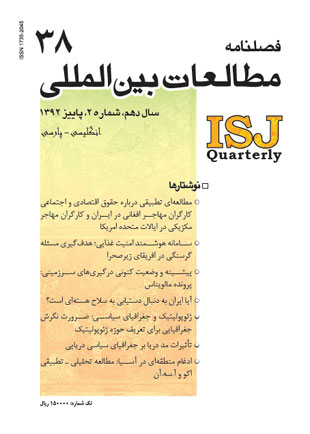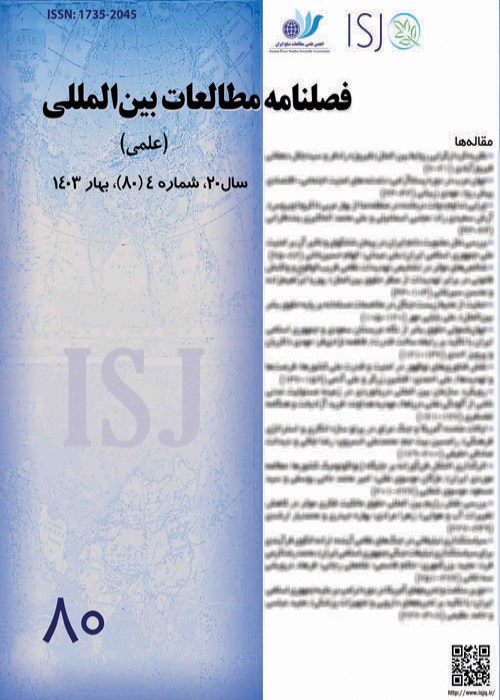فهرست مطالب

نشریه مطالعات بین المللی
سال دهم شماره 2 (پیاپی 38، پاییز 1392)
- بهای روی جلد: 150,000ريال
- تاریخ انتشار: 1392/06/25
- تعداد عناوین: 7
-
- نوشتارها
-
Page 1Migrant workers are ensured basic human rights as well as other rights with consideration to their vulnerable situation. These rights are guaranteed in universally accepted international instruments. Even though migrant workers are not citizens of the host countries, they are still entitled to their human rights and must be protected by the host country. Migrant workers are human beings who are not only entitled to human rights but deserve to have them protected. With the goal of better understanding the rights of migrant workers as per international law and to illustrate how these rights are actually being implemented, this paper describes their economic and social rights in theory and examines these rights in practice as enforced in two of the world’s top ten migrant hosting countries, namely Iran and the United States. The examination of two countries migrant policies allows for a better understanding of the challenges of today’s migrant workers and illustrates their vulnerability and allows for conclusions of the real situation of migrant workers and also recommendations on how to regulate better migrant policies in line with international human rights law. Migrant workers are treated as economic commodities and are sought out for their cheap labor. In Iran and the United States, they are met with different migrant policies and social attitudes; however, both countries need to revise and update their migrant policies to not only meet international standards but also present economic needs and developments.Keywords: Migrant Worker, Afghan, Mexican Labors, Economic Rights, Employment, Social Rights, Equality
-
Page 85Despite the world leaders’ commitment to halve the number of undernourished people by 2015, its absolute number has been on the rise even more compared to the years of 1990-1992. Once again, this actual increase has alarmed the policy makers about the complicated nature of food security. In their effort to ensure food security, the national and international community, has relied on external food aid programs that have shown to be unexpectedly more harmful than remedial for the country and its people. A better approach to food security is that of local empowerment in production, storage and monitoring of food availability, access and utilization. In sub-Saharan Africa, where the proportion of undernourished is the highest globally, the effects of climate change are expected to intensify the already fragile situation in food supply and demand chain. Consequently, anticipatory monitoring systems, such as early warning systems, for both climate and agriculture have been developed since 1970 and constantly evolving. These systems, locally and globally, collect and analyze data for timely and effective warning at the farm and household level as well as national and international levels. The rise in the proportion of undernourished people in addition to many famine related tragedies including the latest food crisis in the Horn of Africa, casts doubt on the effectiveness of early warning systems. A review of early warning systems locally and globally indicates that their high efficiency in predicting “hot spots” is not paired with the adequate response from stakeholders and this is the most critical piece of the food security puzzle that needs to be analyzed and targeted in our fight against hunger.Keywords: Human Security, Food, Africa, Famine
-
Page 105The purpose of this study is clarifying the situation of the Malvinas (Falkland) Islands, which is a genuine injustice protected only by the prevalence of the economic, political and military might of a country that is a permanent member of the United Nations Security Council over a country located “in the periphery of a Eurocentric world.” This situation constitutes a threat against international peace and security, since the 2004 relocation of the United Kingdom's South Atlantic naval command from Ascension Island to the Mount Pleasant base in the Malvinas archipelago and the European Parliament's project to “Europeanize” that base constitute steps towards the transformation of the South Atlantic into a new area of international conflict. The article shows that this is the oldest territorial conflict in the world, an unacceptable remnant of colonialism in the 21st century maintained by a country that is a permanent member of the UN Security Council and has participated, along with the United States of America, in many Peace Missions ordered by this organization in which they overstepped the boundaries of the UN mandate, resulting in suspicious neocolonial behavior on the part of the military forces of both countries This paper offers a historical review of the events during the last 179 years which have made it possible for the United Kingdom to confuse the international community in an attempt to give a veneer of legality to usurpation of the Argentine archipelagos in the South Atlantic.Keywords: South Atlantic Conflict, Colonialism, Neocolonialism, Self, determination, UN Resolution 2065
-
Page 131This article would present comprehensive explanations as to why Iran is not after a nuclear bomb and provide twenty-five reasons to strengthen this position. Examples range from a chronology of Israeli accusations that claim Iran is pursuing nuclear weapons; elaborating on the findings by the International Atomic Energy Agency’s inspectors of Iranian nuclear facilities; the Iranian Supreme Leader Ayatollah Khamenei’s viewpoint on nuclear weapons; the findings of US and other Western intelligence agency’s regarding the Iran’s nuclear capability; and instances of missed opportunity that have evaded a resolution of the nuclear dossier. Furthermore, the paper would elaborate on a framework for diplomatic solution to the nuclear standoff and its contribution to the realization of Weapons of Mass Destruction Free Zone in the Middle East.Keywords: United Nations, Israel, Nuclear Weapons, Diplomacy, US, Iran
-
Page 145Since the creation of the modern academic discipline of geography in Western universities in the late nineteenth century a problematic relationship has existed between the fields of geopolitics and political geography. A concentration upon geopolitics by scholars such as Sir Halford Mackinder and Friedrich Ratzel gave prominence to the geographic approach in general and political geography in particular. However, the association of geopolitics with geographer Karl Haushofer and his exaggerated connections with the Nazi regime tainted the academic consideration of geopolitics, and political geography in general. Nonetheless, as academic consideration of geopolitics faltered after World War Two it was still practiced by governments and given attention by scholars with close ties to governments. In the 1980’s geographers returned to the topic of geopolitics through the approaches of critical geopolitics, feminist geopolitics, and geoeconomics. The reassertion of a geographic perspective into the understanding of geopolitics has been essential into transforming geopolitics from a tool of state elites to a means of understanding global political geographies. This paper explores the different assumptions, processes, and goals of a geopolitics considered through the lens of academic political geography compared to the approach of scholars wanting to inform the policy of a particular state. The benefits of the political geography approach are illustrated. These benefits include the identification of a multi-scalar, multi-process, contextualized and contingent geopolitics. The implications of a political geography approach to geopolitics are a field of inquiry focused on non-state as well as state actors; understanding the importance of connection rather than division; identifying contingency rather than historical determinism, and identifying the geopolitics of peace as much as the geopolitics of conflict.Keywords: Geography, Political Sciences, State, Geopolitics
-
Page 167Rising sea levels in the wake of climate change has the potential to undermine existing legal regimes that govern control of the world’s oceans and continental shelves. Climate-driven environmental changes are already destabilizing the Arctic and fostering new types of alliances. By altering commonly accepted baselines that are used to determine the right of states to extend state control outward from their shores, they also have the potential to undermine fragile accords in the maritime arena, and to create new sources of instability. From a policy perspective, recognizing that rising sea levels will likely undermine existing maritime regimes points to the need for proactive agreements that anticipate changes in the configuration of coastlines. Conceptually, the potential for environmental change to alter jurisdictional arrangements highlights the importance of challenging the long-standing tendency to treat the environment as a constant in geopolitical analyses.Keywords: Geopolitics, Political Sciences, Geography, Sea, State
-
Page 185Since the Second World War, the issue of regional integration has attracted attention of international relations theorists. The EconomicCooperation Organization (ECO) was established in July 1964 by the name of Regional Cooperation for Development (RCD). This organization was disbanded in 1980 subsequent to Islamic Revolution in Iran. But in 1985, all member states decided to resume their cooperation under the name of ECO. Later, collapse of the Soviet Union paved the way for expansion of ECO to 10 member States. In early years of RCD formation, Association of South East Asian Nations (ASEAN) considered today as a successful regional integration organization was established in 1967. The key question that this article poses is that given RCD (later ECO) and ASEAN were formed in relatively similar terms, why does ECO still remain at early stages of integration while ASEAN has displayed a successful pattern of integration in Asia? This paper’s main hypothesis is that although formation of these two institutions was based on “Logic of Consequence,” ASEAN has achieved deep integration and common identity by placing emphasis on “Logic of Appropriateness” while ECO has failed to create common identity among its member states.Keywords: Regionalism, Integration, ECO, International Relations


